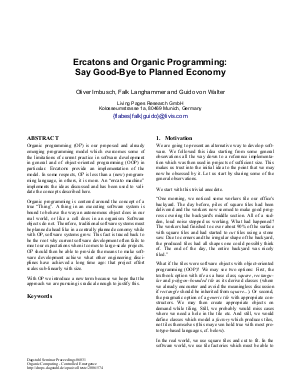Ercatons and Organic Programming: Say Good-Bye to Planned Economy
Authors Falk Langhammer, Oliver Imbusch, Guido von Walter
-
Part of:
Volume:
Dagstuhl Seminar Proceedings, Volume 6031
Part of: Series: Dagstuhl Seminar Proceedings (DagSemProc) - License:
 Creative Commons Attribution 4.0 International license
Creative Commons Attribution 4.0 International license
- Publication Date: 2006-05-16
File

PDF
DagSemProc.06031.4.pdf
- Filesize: 0.73 MB
- 11 pages
Document Identifiers
Subject Classification
Keywords
- Organic
- software engineering
Metrics
- Access Statistics
-
Total Accesses (updated on a weekly basis)
0Document
0Metadata
Abstract
Organic programming (OP) is our proposed and already emerging programming model which overcomes some of the limitations of current practice in software development in general and of object-oriented programming (OOP) in particular. Ercatons provide an implementation of the model. In some respects, OP is less than a (new) programming language, in others, it is more. An "ercato machine" implements the ideas discussed and has been used to validate the concepts described here. Organic programming is centered around the concept of a true "Thing". A thing in an executing software system is bound to behave the way an autonomous object does in our real world, or like a cell does in an organism. Software objects do not. Therefore, traditional software systems must be planned while with OP, software systems grow. This fact is traced back to be the root why current software development often fails to meet our expectations when it comes to large-scale projects. OP should then be able to provide the means to make software development achieve what other engineering disciplines have achieved a long time ago: that project effort scales sub-linearly with size. With OP we introduce a new term because we hope that the approach we are pursuing is radical enough to justify this.
Cite As Get BibTex
Falk Langhammer, Oliver Imbusch, and Guido von Walter. Ercatons and Organic Programming: Say Good-Bye to Planned Economy. In Organic Computing - Controlled Emergence. Dagstuhl Seminar Proceedings, Volume 6031, pp. 1-11, Schloss Dagstuhl – Leibniz-Zentrum für Informatik (2006)
https://doi.org/10.4230/DagSemProc.06031.4
BibTex
@InProceedings{langhammer_et_al:DagSemProc.06031.4,
author = {Langhammer, Falk and Imbusch, Oliver and von Walter, Guido},
title = {{Ercatons and Organic Programming: Say Good-Bye to Planned Economy}},
booktitle = {Organic Computing - Controlled Emergence},
pages = {1--11},
series = {Dagstuhl Seminar Proceedings (DagSemProc)},
ISSN = {1862-4405},
year = {2006},
volume = {6031},
editor = {Kirstie Bellman and Peter Hofmann and Christian M\"{u}ller-Schloer and Hartmut Schmeck and Rolf W\"{u}rtz},
publisher = {Schloss Dagstuhl -- Leibniz-Zentrum f{\"u}r Informatik},
address = {Dagstuhl, Germany},
URL = {https://drops.dagstuhl.de/entities/document/10.4230/DagSemProc.06031.4},
URN = {urn:nbn:de:0030-drops-5744},
doi = {10.4230/DagSemProc.06031.4},
annote = {Keywords: Organic, software engineering}
}
